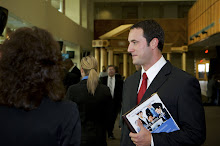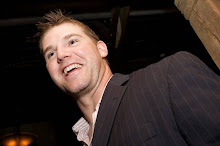Peter Buckley- best known for being on the losing side of decisions & laying horizontal on the mat has become a living legend in Birmingham. But what can you learn from Buckley- perseverance, persistence, losing gracefully??? Yes all these qualities were actively demonstrated during his time in the ring but I think there is something more here. I believe Buckley played to his greatest strength he executed his talent to the highest degree. But what was his talent? "Losing"- yes that's precisely it. Buckley was a natural loser & a damned fine one at that. His ability was to prepare the future champions of Britain exposing them to a challenge to a quality fight, but ultimately a fight they could win. Buckley knew his role all to well & the irony of it is the guy went out on a winning note. So what's the point? The point is know were you fit, know your role, know your strength. It's your obligation to exercise your talent to the fullest. Even if your the most talented loser. I hope Mr. Buckely keeps the winning streak alive as he enters the next round life after sports.
BIRMINGHAM, England -- Peter Buckley, who has lost more times than any modern British boxer has even fought, stepped into the ring for the last time Friday.
Over 19 years, Mr. Buckley built an extraordinary record of 256 losses in 299 bouts. With his 300th and final fight in his hometown of Birmingham, the journeyman finally gained a sort of celebrity here -- less for his losses than for the way he kept coming back for more.
Going Out Fighting
Boxer Peter Buckley fought his 300th and final bout Friday, joining a pantheon of peculiarly British heroes.
Mr. Buckley, who first laced on gloves as an 11-year-old, joins a pantheon of peculiarly British heroes -- athletes whose main quality is their undying optimism in the face of overwhelming odds. The most notable is Eddie the Eagle, a short-sighted plasterer from Cheltenham who took last place at the 1988 Olympics as the sole member of Britain's ski-jumping team.
The 39-year-old Mr. Buckley's career has been filled with "close decisions that could have gone my way," he says. "That is the story of my life."
Friday night his was the third of seven fights at the Aston Events Centre, a ragged sports arena underneath a highway overpass, typical of the arenas where he spent his career. It drew 1,389 fans.
When the bell rang for round 1,745 of Mr. Buckley's career, his opponent Matin Mohammed, came out moving, circling Mr. Buckley around the ring. Mr. Mohammed bobbed and weaved, ducking punches that weren't thrown.
Mr. Buckley, by contrast, moved only when needed, or not much. At the start of the second round, Mr. Mohammed landed two clean shots on Mr. Buckley's chin. The veteran shook his head. On the counterattack, Mr. Buckley lodged points with quick jabs and an occasional left hook.
That defensive style made Mr. Buckley a valuable part of an unheralded group of boxers: the journeymen who act as a testing ground for up-and-coming fighters, many in their first fights. In his 256 losses, he was knocked out just 10 times. The light welterweight, at just under 10 stones, or around 140 pounds, and 5-feet-8 inches tall, fought 42 future British, European or world champions.
Had he won more fights, he wouldn't have been such an in-demand opponent, Mr. Buckley says.
His final opponent Mr. Mohammed is like many who have come before. He had fought just once before, a draw against Mr. Buckley just a month ago.
In a sport where anyone with 40 bouts under their belts can be seen as a veteran, the record for the most professional fights belongs to U.S. boxer Reggie Strickland with 360 fights, 276 of which were losses, boxing experts say. Mr. Strickland, in an interview from his home in Indianapolis, says boxing authorities withdrew his fight license after he was in a car accident and forced him to retire "prematurely" in 2005 at age 37.
Mr. Buckley "is crazy" to retire now, Mr. Strickland says. He's "got another good year or so left."
Boxing fans may wonder why Mr. Buckley was allowed to fight as often as he did. Robert Smith, an official at the sport's governing body, the British Board of Boxing Control, said the board made sure Mr. Buckley didn't become a punching bag. Mr. Buckley, like all boxers, had a medical checkup before every fight, blood tests and a yearly brain scan. Mr. Smith said he had "no concerns with Peter." His retirement is the "sensible thing to do," he added.
Mr. Buckley set 300 as his career goal earlier this year and wanted to finish in front of a home crowd. To make it, he fought seven times in the past eight weeks, pushing up against the sport's one-fight-a-week rule.
The most he has earned from a fight is about £3,000 (about $4,800), and the smallest crowd he has fought in front of is a handful of spectators. Often, he is paid as little as £300 a fight. Every day, Mr. Buckley sticks to his schedule: three hours of running outside, weight lifting and working out with punching bags at a local gym.
He has fought on as little as one hour's notice and turned up for fights with the scars of his last still on his face. He once drove six hours from Birmingham to Glasgow, Scotland, where he was met at the fight arena's parking lot and 10 minutes later found himself in the ring. In what he describes as his worst fight, Mr. Buckley was knocked down three times in the first round before the referee stepped in. After each fight, he calls his longtime girlfriend, Tania Donnelly, to say he is fine.
Born into a family of nine children in a working-class neighborhood in Birmingham, Mr. Buckley was caught robbing a shop and sent for four months to a youth detention center when he was 15 after his father died. He spent the next several years in and out of detention centers. A local professional fighter named Rocky Lawlor told him he would take him to a gym to keep him out of trouble. Mr. Lawlor told him to meet him there the next week, with the words "I mean it. Don't mess me about." There, he met trainer Norman "Nobby" Nobbs.
He turned pro in 1989 at age 20. In his first professional fight, "over six rounds, I beat him out of sight. I broke his nose, and yet they gave it a draw," says Mr. Buckley.
Mr. Nobbs remembers the fighter starting out with visions of future glory. With each decision against him, "he thought 'hang on a bit,' " Mr. Nobbs says, in a phone interview from his home in Birmingham.
On his recent streak of 88 fights without a win, Mr. Buckley only gained fans. As he approached his final bout, local newspapers and some TV stations paid attention. "People are coming up in the street, people who didn't know him before, shaking his hand and saying he's a credit to Birmingham and a credit to the U.K.," says Ada Foyle, who has known Mr. Buckley since childhood.
With five seconds left Friday night, Mr. Buckley unleashed a wild swing for the last punch of his professional career. It missed.
The bell rang. The crowd rose. Peter Buckley's name filled the air of a boxing arena for the first, and last, time.
The judge's decision came quickly. The score was 40 to 38 points. A tattooed arm was held up. The perennial loser had won.
"The Boxer" by Simon and Garfunkel boomed over the loud speakers. "I am leaving, I am leaving, but the fighter still remains."
Back in Mr. Buckley's changing room, fans asked him to autograph their fight programs, a first in his career.
"I know when the journey is over. It is over. That is it now," Mr. Buckley said.
Minutes later, as he disappeared into the crowd at a bar set up in a tent next to the arena, chants erupted: "There's only one Peter Buckley, one Peter Buckley."
The next night, Mr. Buckley left a party in his honor early. Sitting alone in the living room of his home in Birmingham, he said, "I felt empty thinking, 'What will I do now?' "
http://online.wsj.com/article/SB122566709100191517.html?mod=todays_us_nonsub_page_one
Write to Alistair MacDonald at alistair.macdonald@wsj.com
![[SB122565810092391275]](http://s.wsj.net/public/resources/images/OB-CP365_boxer0_D_20081102145525.jpg)
![[Peter Buckley]](http://s.wsj.net/public/resources/images/HC-GM937_Buckle_BV_20081102175722.gif)




No comments:
Post a Comment